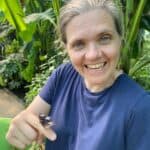Profile
Callum Thomas
-
About Me:
I was born in the tropical north of Australia which is probably why I love studying bugs. My current job is to look after the building where all our different kinds of bugs are kept. I love the outdoors, hiking, foraging and learning languages.
-
Read more
I live in Surrey with my husband and our cats Pippin and Phoebe. I am originally from Queensland (in Australia), where there are many different bugs, birds and even crocodiles. This is probably why I love studying nature so much now!
I recently studied for two years in Germany before moving to the UK. I love travelling and learning languages and can speak Italian and some French and German. In our spare time my husband and I love to go foraging in the woods for mushrooms, herbs and berries. We also love gardening and have an allotment and lots of houseplants at home!
-
My pronouns are:
He/him.
-
My Work:
I look after the part of our institute where people work on all different kinds of insects: bees, mosquitoes, midges and flies. Most of these insects are studied because they spread different kids of viruses to people or animals.
Our institute does lots of research to try and prevent these viruses making people and animals sick.
-
Read more
I work at the Pirbright Institute which is a research centre in Surrey that studies lots of different kinds of viruses that affect animals. Specifically, my job is to manage the insectary – the building where we keep insects to study.
Some insects can spread viruses or parasites between people and animals, usually when they bite animals to drink their blood! A good example is mosquitoes: in tropical countries, mosquitoes can spread many different viruses that can make lots of people very sick. Some of the viruses you might have heard of are Zika virus, dengue virus and yellow fever virus. Other insects like midges or biting flies can also spread diseases to animals like cows, horses or sheep which can also make them very sick. These viruses can make life very difficult for farmers and animal breeders.
As part of my job, I have to talk to the different researchers that keep insects in our building and make sure that the conditions inside are kept at the right levels so that the insects can grow and reproduce happily. Many of these species are tropical, so we have to keep them warm and humid for them to grow properly!
I also spend a lot of time talking to engineers that look after all the machinery and equipment that we use in the lab and when equipment breaks down I have to call someone to come and fix it.
-
My Typical Day:
I wake up at 7 and have breakfast, then I drive or ride my bike to work. Every morning at 8:30 I have a meeting with all the people who look after the building I manage, to hear if there are any problems.
I also have meetings with the scientists that use the building to see if they have any problems or issues when doing their experiments.
I spend most of my day writing emails to check if problems are being fixed, or walking around the building to check if there are any new problems that have come up.
Sometimes if we have new scientists coming to work in the building, I have to take them on a tour and show them where everything is and make sure they understand all the rules we have in place to keep everybody safe at work.
If the scientists that look after our insects are away on holidays, sometimes I will also look after the insects for them!
I usually go home at 5pm.
-
Read more
I manage a big laboratory building used by lots of other scientists. Every morning I have a meeting with all the engineers and technicians who maintain the building to hear if there are any problems with the different systems that keep the building running, like the heating or the water and electricity supply.
I also sometimes have morning meetings with the scientists that use the building to see if they have any problems or issues when doing their experiments. Because the insects will die if they get too hot or too cold, we have thermometers in every room which are linked to an alarm which will tell us if the temperature changes too much. I also can log in on my computer and see graphs of the temperature and humidity in each room to make sure it is at the right level.
If there are any problems, I have to talk to the engineers and repairmen to try and get them fixed as quickly as possible so that the insects or experiments people are running are not affected. I spend most of my day writing or responding to emails to track how progress is going on any problems we have that need to be fixed. I also often will go around the building and inspect things like temperature gauges, taps and air-conditioning vents to make sure everything is working properly.
Sometimes if we have new scientists coming to work in the building, I have to take them on a tour and show them where everything is and make sure they understand all the rules we have in place to keep everybody safe at work. Because we don’t want anyone to get hurt at work, and we don’t want insects to escape, we have to do lots of planning and put controls in place to keep everybody safe.
I often cover for other scientists if they are on holiday as the insects always need someone to be around to look after them! Insects aren’t as difficult to look after as a cat or a dog, but they still need someone to make sure they have food and that their containers are clean and tidy.
-
What I'd do with the prize money:
I would love to spend the money on developing teaching aids and materials that I can bring to schools to teach students more about the life cycle of insects and the way that they spread viruses between animals and people.
Ideally, I would like to develop some interactive activities using models or charts, to show how viruses move throughout insects’ and host animals’ bodies, and how they move between different hosts.
-
Education:
- Goondi State School, Innisfail, Australia
- Innisfail State High School, Innisfail, Australia
- University of Queensland, Brisbane, Australia
- Ludwig-Maximilian University, Munich, Germany
-
Qualifications:
- High School Certificate (similar to GCSE): This allowed me to get into university and prepared me to enter the adult world.
- Bachelor of Arts: I was always interested in languages and history. My arts degree helped me become very good at writing and understanding and thinking about things other people have written, both very useful skills for a scientist!
- Bachelor of Science: My science degree taught me lots of the basics of biology and gave me some practical experience working in a laboratory.
- Master of Science: My Master’s degree allowed me to focus on more advanced topics in biology, like evolution, in more depth. I also got lots of practical experience in a research laboratory. Finally, I got to make heaps of amazing friends from all around the world and live in another country!
-
Work History:
- Research Assistant.
- Research Scientist.
-
Current Job:
- Laboratory Manager.
-
Employer:
The Pirbright Institute, Woking.
-
My Interview
-
How would you describe yourself in 3 words?
Bug-loving biologist.
What did you want to be after you left school?
I had no idea what I wanted to do!
Were you ever in trouble at school?
Not very often, I was a bit boring.
If you weren't doing this job, what would you choose instead?
Probably a graphic designer or computer programmer.
Who is your favourite singer or band?
Carly Rae Jepsen.
What's your favourite food?
Any kind of pasta dish!
If you had 3 wishes for yourself what would they be? - be honest!
I could spend more time with my friends, I could see my parents more often, I could travel anywhere in the world for free!
Tell us a joke.
There are two fish in a tank. One looks at the other and asks, "Do you know how to drive this thing?"
-







